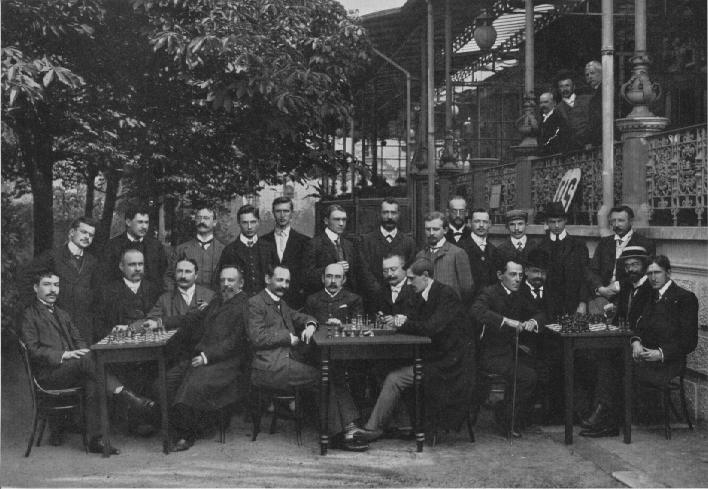
A Century of Chess: Karlsbad 1907
If any ascent in chess history is comparable to Bobby Fischer’s, it’s that of Akiba Rubinstein in the period 1906-1909. What’s important to understand is that chess in the classical period was dominated by the German cultural empire, very much as high-level chess was a Soviet pastime in the 1950s and ‘60s. The chess stars of the classical period were of the German (and Austro-Hungarian) bourgeoisie. They prided themselves on their non-chess professional accomplishments and had a certain condescension towards their own chess success (treating chess as a hobby at which they happened to excel). This was the attitude of Lasker, Tarrasch, Maróczy, etc. Rubinstein was of a different ilk.


Here is the introduction to a book about Rubinstein, written years later, in 1940, but dripping with condescension: “Deep out of the shadows, out of the Middle Ages, came Akiba Rubinstein. A dark squalid Ghetto of Russia-Poland was the Bethlehem in which his spark of life was kindled….the lines of his ‘upbringing’ were marked out to a nicety…..He would become an ornament of the Ghetto and no more.”

Rubinstein’s genius was palpable at Carlsbad 1907 and with his victory he was suddenly a world championship contender.
The tournament in general marked a sea-change in classical chess. The new generation that emerged around 1905 had been proving itself dangerous to the entrenched stars of classical chess, but they had mostly been excluded from the top tournaments. (For instance, the great Ostend tournament of 1907 divided competitors into two sections, with Schlechter, Marshall, Janowski, Tarrasch in a cozy grandmaster club and all the younger masters relegated to the undercard.) At Karlsbad, the younger masters had their chance against the cream of the world’s elite and demonstrated that they were more than a match. Rubinstein won. Nimzowitsch, Vidmar, and Duras took top places. Spielmann and Tartakower acquitted themselves well, while great masters like Marshall, Janowski, and Mieses sank to the middle or bottom of the crosstable.  The word ‘hypermodern’ hadn’t yet been coined, but there was a definite sense that the younger generation played somehow differently – Nimzowitsch and Tartakower were deep into their experiments with decentralized opening systems and deferred combat. Most importantly, though, the younger generation seemed to have a different attitude: they took chess more seriously. Rubinstein and Nimzowitsch, in particular, were confirmed fanatics and there was a sense with them (as with Fischer) that chess wasn’t really a game, it was a full-throated calling, with buried secrets that revealed themselves only through deep study.
The word ‘hypermodern’ hadn’t yet been coined, but there was a definite sense that the younger generation played somehow differently – Nimzowitsch and Tartakower were deep into their experiments with decentralized opening systems and deferred combat. Most importantly, though, the younger generation seemed to have a different attitude: they took chess more seriously. Rubinstein and Nimzowitsch, in particular, were confirmed fanatics and there was a sense with them (as with Fischer) that chess wasn’t really a game, it was a full-throated calling, with buried secrets that revealed themselves only through deep study.
Maróczy took an early lead with his usual industrious chess.
Rubinstein caught him in round 18.
Mieses was with the leaders for the first half and then collapsed spectacularly. Vidmar kept close until round 19.
Leonhardt finished in third in the performance of his career, although his showing is somewhat deceptive – he was a non-factor for most of the tournament and won his last six games, taking advantage of a tired field.
Great tournament books were rare in the 1900s, and Karlsbad was one of the few to receive an appropriate treatment, in the magisterial tournament book written by Schlechter and Marco. Marco was one of the best, most colorful chess writers ever, and the book is the classical era’s answer to Zurich 1953.

Sad to say, the tournament is goodbye to Mikhail Chigorin, who died at the start of 1908. I haven't said much about him in this series - by the 1900s he was basically a second-tier player although a frequent tournament competitor - but he was of course an idol for an earlier generation and it's been something of a badge of authenticity for combinative players from Marshall to Alekhine to Spassky to not pay too much attention to the classical style and, somewhat the way a music snob would swear by some obscure band, to claim that Chigorin was the true genius of his era. 